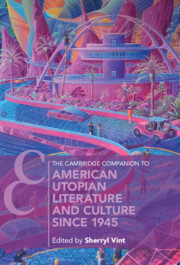Book contents
- The Cambridge Companion to American Utopian Literature and Culture since 1945
- The Cambridge Companion to American Utopian Literature and Culture since 1945
- Copyright page
- Contents
- Figures
- Contributors
- Introduction
- Chapter 1 Pandemics and the Lesson of History
- Chapter 2 American Futures
- Chapter 3 Engendering Utopia
- Chapter 4 America and/as White Supremacy
- Chapter 5 American Spirituality
- Chapter 6 Black Escapes and Black Wishlands
- Chapter 7 Latinx Belonging in New World Borders
- Chapter 8 Educating Desire
- Chapter 9 Utopia after American Hegemony
- Chapter 10 Technological Fantasies
- Chapter 11 Utopian Spaces
- Chapter 12 Environmentalism and Ecotopias
- Chapter 13 Economic Justice
- Chapter 14 Renewing Democracy
- Chapter 15 The Time of New Histories
- Works Cited
- Index
- Cambridge Companions To Literature
Chapter 1 - Pandemics and the Lesson of History
Published online by Cambridge University Press: 09 May 2024
- The Cambridge Companion to American Utopian Literature and Culture since 1945
- The Cambridge Companion to American Utopian Literature and Culture since 1945
- Copyright page
- Contents
- Figures
- Contributors
- Introduction
- Chapter 1 Pandemics and the Lesson of History
- Chapter 2 American Futures
- Chapter 3 Engendering Utopia
- Chapter 4 America and/as White Supremacy
- Chapter 5 American Spirituality
- Chapter 6 Black Escapes and Black Wishlands
- Chapter 7 Latinx Belonging in New World Borders
- Chapter 8 Educating Desire
- Chapter 9 Utopia after American Hegemony
- Chapter 10 Technological Fantasies
- Chapter 11 Utopian Spaces
- Chapter 12 Environmentalism and Ecotopias
- Chapter 13 Economic Justice
- Chapter 14 Renewing Democracy
- Chapter 15 The Time of New Histories
- Works Cited
- Index
- Cambridge Companions To Literature
Summary
A long tradition of pandemic – or plague – literature, dating back at least as far as classical Greece, has used catastrophic communicable disease as a backdrop to explore the human condition: what it means to live in a community of other humans, and, as awareness of the crises of environmental devastation and climate change grows, on a planet with other living organisms. In different ways, and with differing resolutions, twentieth- and twenty-first-century works of pandemic fiction show how pandemics stem not only from human practices, but also from the values, beliefs, and stories about the past – the histories – in which they are rooted. Whether dystopic or utopic, apocalyptic or contained, literary pandemics warn that in order to change the way humans collectively inhabit the world, we need to change the dominant stories we tell about it.
Keywords
- Type
- Chapter
- Information
- Publisher: Cambridge University PressPrint publication year: 2024



